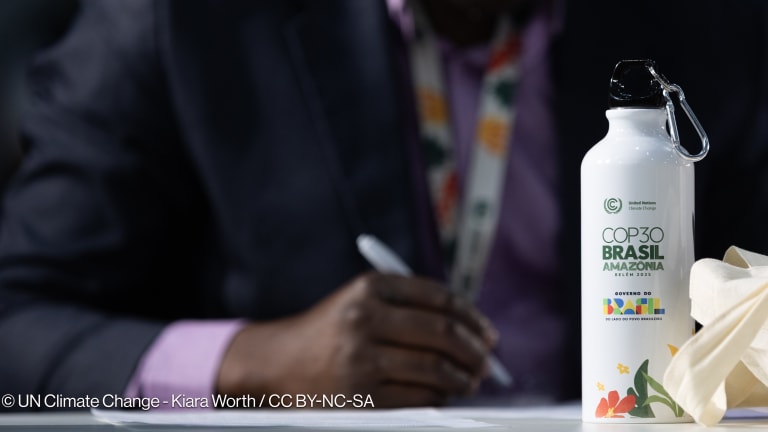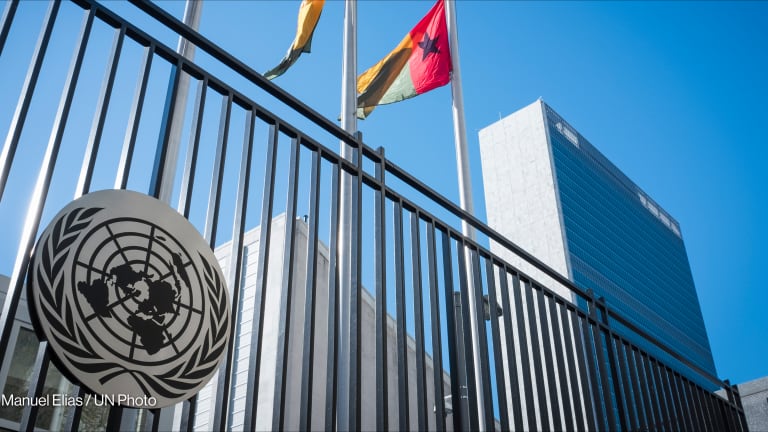
WASHINGTON — A pledging conference hosted by Germany, Denmark, the European Union, and the United Nations raised $1.7 billion Tuesday for the Central Sahelian countries of Burkina Faso, Mali, and Niger.
In announcing that total, U.N. Undersecretary-General for Humanitarian Affairs Mark Lowcock called the conference “a successful event” with a “really good outcome.” Of the pledged funds, $997 million is for the rest of 2020, while the remaining $725 million is for 2021 and beyond.
The Sahel has faced widespread humanitarian crises in recent years. According to U.N. Secretary-General António Guterres, displacement has increased twentyfold in just two years and the number of families facing hunger has tripled. He appealed for $2.4 billion from the international community to address the regional crisis over the next several years.
“We need to make space for vital humanitarian assistance and investments in development and people,” Guterres said at the pledging event. “The Sahel is a microcosm of cascading global risks converging in one region. It is a warning sign for us all requiring urgent attention and resolution.”
More on the Sahel:
► Satellites help fill food security data gaps in Sahel
► Food security, troops in the spotlight at US Sahel policy hearing
U.N. agency heads, NGO staff members, and foreign ministers from around the world sounded the alarm about the multilayered crisis impacting more than 13 million people in the Sahel, including 1.5 million displaced people and 5 million children. Lowcock said the compounding situation is caused by humanitarian needs that are not being properly addressed, such as chronic poverty, underdevelopment, demographic growth, and climate change. Those factors are exacerbated by “poorly managed conflict and violence.”
“Civilians are threatened by intercommunal conflict between farmers and herders who see their livelihoods under pressure, by violent criminal gangs and illicit networks, and by extremist groups who use terror as a tactic of choice,” Lowcock said.
“Please keep the Sahel higher on your policy agenda, and pay far more attention to addressing the root drivers of the Sahel crisis,” he continued. “Without those efforts, humanitarian needs will only continue to grow.”
Lowcock called for greater investment in basic services like education, health, clean water, sanitation, and family planning. Increased agricultural productivity, urban planning, and sustainable economies will be vital to manage the impacts of climate change and demographic growth, he said.
Some countries announced new money at the conference. Others emphasized past or current spending in the region while expressing support for greater high-level engagement on the crisis. Danish Minister for Development Cooperation Rasmus Prehn, who co-hosted the pledging conference, said the event raised well above what he had hoped for and showed that “international solidarity still exists.”
Twenty-four governments and institutional donors announced pledges, which are expected to help 10 million people through 2021.
“The Sahel is a microcosm of cascading global risks converging in one region. It is a warning sign for us all requiring urgent attention and resolution.”
— Antonio Guterres, secretary-general, U.N.UNICEF Executive Director Henrietta Fore said the crises in the Sahel were “a toxic brew of instability, armed violence, extreme poverty, hunger, and now COVID-19.” She said 2.9 million children are in danger of acute malnutrition — a 20% rise since the beginning of the year.
U.N. High Commissioner for Refugees Filippo Grandi called for a Marshall Plan-like effort for the Sahel, saying the fact that regional humanitarian response plans are only 35% funded on average is extremely worrying. He called forced displacement “a measure of crisis,” with growing levels in the Sahel indicating the situation is not sufficiently addressed.
“We need to inject a sense of urgency into this response that I’m afraid I do not see yet coming out of the international community. But I hope this conference, for which I’m very grateful, will contribute to that,” Grandi said.
“States building their capacity is the fundamental issue in the Sahel. And part of the success of the [humanitarian-development-peace] nexus is faster action by development actors and by international financial institutions,” he added. “Their interventions need to accelerate their pace. We can’t wait five years for those interventions to bear fruit.”








